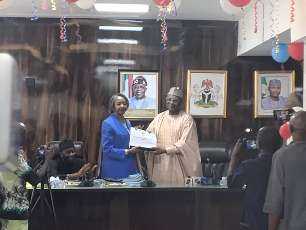Professor Mahmood Yakubu on Tuesday officially bowed out as Chairman of the Independent National Electoral Commission (INEC) after a transformative decade at the helm.
In a defining moment for Nigeria’s electoral leadership, Professor Yakubu handed over to May Agbamuche-Mbu, the Commission’s most Senior National Commissioner by date of appointment.
Yakubu made the announcement during a packed quarterly consultative meeting with Resident Electoral Commissioners (RECs) in Abuja, marking the end of an era that saw Nigeria’s election management system evolve from analogue administration to a digital framework driven by data, transparency, and technology.
“Having been privileged to serve the Commission for ten years, I have decided to step aside in accordance with the Constitution,” Yakubu declared. “In the interim, I am handing over to Ms. May Agbamuche-Mbu, who will serve in an acting capacity pending the appointment of a substantive chairman.”
He explained that his decision was in line with Section 306 of the 1999 Constitution (as amended), saying the transition would give the appointing authorities ample time to name a new leader capable of navigating the complex electoral terrain of Africa’s largest democracy.
Yakubu disclosed that the ongoing Continuous Voter Registration (CVR) exercise launched seven weeks ago has drawn record participation, with 6.8 million Nigerians registering online and 1.2 million completing physical registration.
“Our Resident Electoral Commissioners have been publishing weekly figures by state, gender, age, and occupation. The numbers so far are encouraging,” he noted, adding that the exercise will continue until August 2026 ahead of the next general elections.
The outgoing INEC chairman rolled out a packed electoral timetable:
Anambra Governorship — November 2025
FCT Area Council Polls — February 2026
Ekiti Governorship — June 2026
Osun Governorship — August 2026
He said the Commission was awaiting the passage of a new Electoral Act, expected to further entrench transparency, electronic transmission of results, and tighter control of political financing.
Yakubu’s decade-long stewardship brought sweeping reforms, including:
A consolidated biometric voter register;
Online nomination portals for political parties;
Digital accreditation for observers and media;
Deployment of Election Monitoring and Support Systems (EMS); and
Launch of a Voter Self-Service Portal and virtual training platforms for election officials.
“We have replaced many manual processes with technology. From candidate nominations to polling management, INEC is now more data-driven and transparent than ever,” he said.
Despite notable progress, Yakubu warned that insecurity and natural disasters still pose significant threats to voter participation.
“Citizens displaced by banditry and floods must not be disenfranchised. We must review our framework for voting by internally displaced persons to ensure inclusion,” he cautioned.
In an emotional close, Yakubu thanked INEC staff, political stakeholders, civil society groups, security agencies, and especially members of the National Youth Service Corps (NYSC).
“Young Nigerians serving in the NYSC are among the most patriotic and knowledgeable election officials I have worked with,” he said, to thunderous applause.
He also unveiled two publications chronicling his tenure:
Election Management in a Decade: 2015–2025
Innovations in Electoral Technology: 2015–2025
“I thank Nigerians for their support and criticisms alike. Both have strengthened our democracy,” he conclude.
Years in Office: 2015–2025Major Elections Conducted: Two general elections (2019, 2023), multiple off-cycle polls
Key Innovations: BVAS, IReV, electronic nomination & monitoring
New Voter Registrations: Over 20 million
Publications: Election Management in a Decade (2015–2025); Innovations in Electoral Technology
Legacy Quote: “Technology has become the heartbeat of credible elections in Nigeria.”
As May Agbamuche-Mbu assumes the mantle of leadership, Nigerians and the global community alike will watch closely to see whether the next chapter of INEC’s journey can build on Yakubu’s decade of reform, and deliver a democracy that is both inclusive and unshakably credible.
